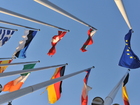A Syria ceasefire deal agreed by the United States and Russia could mark a "turning point" in the five-year conflict if implemented, U.S. Secretary of State John Kerry said Saturday.
 Full Story
Full Story
North Korea's nuclear threat has grown significantly following its latest and largest nuclear test and a series of missile launches, analysts say, with some South Korean newspapers even theorizing about an atomic attack on Seoul.
The South Korean capital stayed calm Saturday, with residents immune to near-daily threats from their neighbor, but newspapers and analysts saw Friday's test as a game-changer.
 Full Story
Full Story
Long cast in supporting roles in the shadow of their male counterparts, women are taking an increasingly active role in the organisation and execution of attacks by jihadist groups.
That much emerges clearly from Thursday's arrest of three heavily radicalised women plotting an attack in central Paris using a car laden with gas cylinders.
 Full Story
Full Story
The U.S. Navy again has accused Iranian patrol boats of harassing an American warship in the Persian Gulf, this time with a Revolutionary Guard vessel nearly causing a collision with the USS Firebolt. Why does this keep happening?
 Full Story
Full Story
Saeed Beg and his family live in a two-room mud house with no electricity or running water, no bathroom, no kitchen and no furniture apart from a few threadbare rugs and a couple of thin mattresses.
With his mother, wife and five children aged from 8 months to 14 years sitting alongside, he describes life in the Sarkand valley of Afghanistan's far northeastern Wakhan corridor as "very difficult." As he talks, the face of a child laying kindling on the roof to dry appears in the pentagonal hole in the ceiling — typical of the homes of Ismaili Muslims, supported by five pillars. The hole lets in the fading evening light, and when Beg's wife Azalma sets a fire, the smoke curls up toward the velvety-blue, starlit sky.
 Full Story
Full Story
In the heart of the Syrian city of Homs, workers clear rubble and clean the blackened walls of the war-ravaged old market in a bid to restore its former glory.
 Full Story
Full Story
The Group of 20 summit opens Sunday in the scenic city of Hangzhou, providing China's image-sensitive rulers an opportunity to showcase the country's emergence as a global powerhouse.
The government has spruced up the city, best known for its island-dotted West Lake, shut down thousands of factories to ensure telegenic blue skies, and rolled out restrictive security precautions.
 Full Story
Full Story
One year since Germany controversially opened its arms to Syrians fleeing war, the EU has tightened the borders of "Fortress Europe" but remains deeply divided over how to share the refugee burden.
 Full Story
Full Story
With his fate still uncertain just hours after the launch of the July 15 coup, Turkey's President Recep Tayyip Erdogan received his first call of support from a foreign leader.
On the other end of the line was Qatar's emir, Tamim bin Hamad Al-Thani, giving his unequivocal backing for the embattled leader, Erdogan told Turkish media.
 Full Story
Full Story
War-torn South Sudan's slide into chaos resumed last month with fresh fighting in the capital Juba that forced rebel leader turned vice president and peace deal signatory Riek Machar to flee.
 Full Story
Full Story



